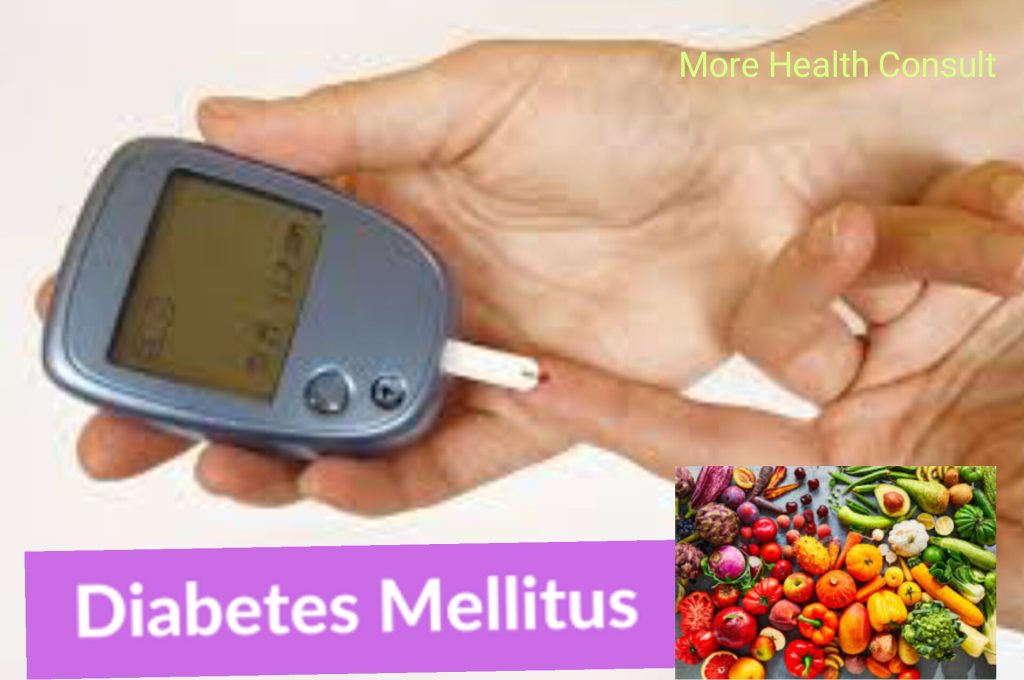
DIABETES MELLITUS
Key facts
Diabetes is a major cause of blindness, kidney failure, heart attack and lower limb amputation. A healthy diet, regular physical activities maintaining a normal body weight and avoiding tobacco use are ways to prevent or delay the onset of type 2 diabetes.
Introduction
Diabetes is a life-changing condition that requires careful blood sugar management and healthy lifestyle strategies for a person to manage it.
Definition
Diabetes which is also known as high blood glucose is a disease that results in too much sugar in the blood it’s a group of common endocrine diseases characterized by sustained high blood sugar levels. This is due to either the pancreas not producing enough insulin or the cells of the body becoming unresponsive to the hormone ie when the body cannot effectively use the insulin it produces.
What is insulin
Insulin is a hormone that regulates blood glucose in the body. It is a hormone produced by an endocrine gland called the pancreas.
Types of Diabetes
- Type 1 diabetes
Previously known as insulin-dependent diabetes.
It is characterized by deficient insulin production, the main cause is unknown but it is associated to autoimmune condition. The onset is usually sudden and occurs at any age affecting both males and females and it usually requires daily administration of insulin.
- Type 2 diabetes
It is characterized by the inability of the body to respond to insulin, it can be associated to genetic factors, sedentary lifestyle, obesity. The onset is usually gradual and mostly occurs in adult affecting both male and female, does not usually depend on the administration of Insulin.
- Gestational diabetes
This usually occurs during pregnancy usually caused by insulin blocking hormones that are produced during pregnancy.
Causes
The cause are usually due to
- Insulin insufficiency
- Gradual insulin resistance
Risk factors:
- Family history
- Age
- Obesity
- Sedentary lifestyle
- Pregnancy (women)
- Tobacco consumption
Signs and symptoms
- Frequent urination
- Increased thirst
- Increased hunger
- Unexplained weight loss
- Blurred Vision
- Fatigue
- Frequent skin infection
- Numbness and tingling of hands and foot
- Slow wound healing
How does diabetes occur?
Glucose mainly comes from food consumed and it’s the body source of energy.
Normally after eating food (carbohydrate) they are converted to glucose in the blood. The blood carries glucose to all parts of the body cells to use as source of energy in order to function properly with a help of a hormone called insulin.
In the case of diabetes, the glucose in the blood cannot be carried to the body cells to use either as a result of the body not producing insulin or as a result of the body not being able to use the insulin produced. Thereby causing a build-up of glucose in the blood which is known as diabetes.
Treatment/management
Medication:
- Insulin
- Antihyperglycemic
Other forms of management include
- Regular exercise
- Regular blood sugar monitoring
- Proper weight maintenance
- Eating a healthy diet
- Proper hydration
- Avoid smoking
- Avoid sedentary lifestyle.
Healthy lifestyle tips for people living with diabetes
- Always keep your blood glucose level at check
- Take medications properly and regularly as prescribed.
- Make sleep a priority. Get at least 7 hours of sleep every night.
- Healthy foods and drinks. Add more fruits and vegetables to your daily meals. Reduce sugar, salt, white grains, foods high in saturated fat, and processed foods.
- Stay hydrated. Choose water over sugary drinks such as sodas, juices, sports drinks, and sweetened coffees and teas. Make water more exciting by adding flavorings, like mint, lemon, or cucumber.
- Pay attention to your body, don’t wear shoes that are tight or likely to cause injury your feet. Take any cut or wound seriously.
- Stay Active. Being active has many health benefits. It helps improve your mood and overall health. Find ways to move for 30 minutes a day, 5 times a week for a total of 150 minutes of physical activity each week. Even 5 to 10 minutes at a time can add up, so move your body when you can.
- Lower your stress level. Take a break from daily stressors with a 10-minute walk or spend time in nature to relax.
- When you are feeling stressed, pause… take 3 deep breaths… and think about something that makes you smile.
- Reduce toxins. Toxins can be things we eat, inhale, or are in contact with through the environment. Tobacco products are an example of a toxin.
- Think holistically. Many areas of health are connected. For example, your mental health impacts your physical health Look at the 6 stepping stones and choose one as a place to start.

